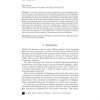Free Online Productivity Tools
i2Speak
i2Symbol
i2OCR
iTex2Img
iWeb2Print
iWeb2Shot
i2Type
iPdf2Split
iPdf2Merge
i2Bopomofo
i2Arabic
i2Style
i2Image
i2PDF
iLatex2Rtf
Sci2ools
111
click to vote
JOLLI
2008
2008
Meaning and Dialogue Coherence: A Proof-theoretic Investigation
Abstract. This paper presents a novel proof-theoretic account of dialogue coherfocuses on an abstract class of cooperative information-oriented dialogues and describes how their structure can be accounted for in terms of a multi-agent hybrid inference system that combines natural deduction with information transfer and observation. We show how certain dialogue structures arise out of the interplay between the inferential roles of logical connectives (i.e., sentence semantics), a rule for transferring information between agents, and a rule for information flow between agents and their environment. The order of explanation is opposite in direction to that adopted in game-theoretic semantics, where sentence semantics (or a notion of valid inference) is derived from winning dialogue strategies. That approach and the current one may, however, be reconcilable, since we focus on cooperative dialogue, whereas the game-theoretic tradition concentrates on adversarial dialogue.
| Added | 13 Dec 2010 |
| Updated | 13 Dec 2010 |
| Type | Journal |
| Year | 2008 |
| Where | JOLLI |
| Authors | Paul Piwek |
Comments (0)

